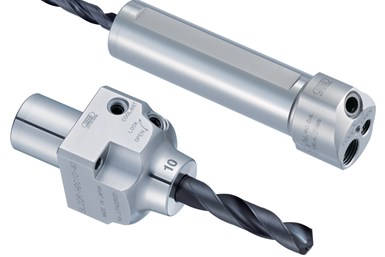Big Kaiser Expands Hydraulic Chuck Offering for Swiss Lathes
Company adds inch-sized, standard-type chucks and new F and R type chucks to its offerings for Swiss lathes.
Share






Big Kaiser, provider of high-precision tooling systems and solutions for metalworking, has expanded its hydraulic chuck offerings for Swiss lathes to include inch-sized, standard-type chucks, plus new F Type and R Type chucks. It now provides standard type hydraulic chucks in inch sizes with tool side clamping, with a clamping range of 1/8", 3/16" and 1/4".
The new F Type’s single wrench reportedly enables easy cutting tool changes on the tool post. The rear clamping design is meant to provide easy access. It is suitable for front tool post, and features clamping from the opposite side of the cutting tool. The F Type is available in a clamping range of 3 to 10 mm and coolant delivery is possible with an Rc (PT) 1/8" screw.
The new R Type features a block design and tightening at an offset position in the tool side, which reportedly eliminates interference at the upper or lower tool post positions. The R Type is available in a clamping range of 3 to 10 mm and its oil hole drills can be used for coolant delivery when mounted on the upper section.
These hydraulic chucks use a hex wrench that requires only two to three turns for both clamping and unclamping, according to the company. Tightening is complete when the clamping screw hits the bottom; controlling tightening torque is not needed. Big Kaiser states that, once a hydraulic chuck is centered, the runout will not vary, even if a cutting tool is changed repeatedly. Hydraulic chucks have a standard pipe thread for coolant-through connection and are available for most Citizen and Star machines with a 3/4" or 22 mm straight shank.
Related Content
-
Sandvik Cormant's End Mills Eliminate Machining Chatter
The company’s CoroMill Dura line of solid end mills has been extended with aluminum-specific tools.
-
Kennametal's Expanded Tooling Portfolio Improves Performance
The company has launch eight new products that expand on and support existing platforms across multiple applications.
-
How to Mitigate Chatter to Boost Machining Rates
There are usually better solutions to chatter than just reducing the feed rate. Through vibration analysis, the chatter problem can be solved, enabling much higher metal removal rates, better quality and longer tool life.
.png;maxWidth=970;quality=90)
.JPG;width=70;height=70;mode=crop)











.png;maxWidth=300;quality=90)







.png;maxWidth=970;quality=90)